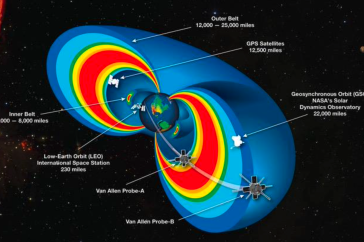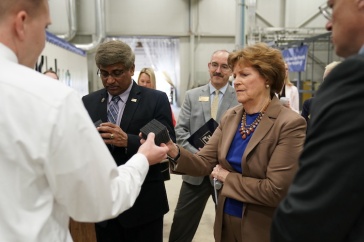
Graduate students test equipment in the anechoic chamber, one of the Space Technology Hub's facilities.
When engineers at Creare wanted to test their space instruments destined for Saturn’s largest moon, they turned to the University of New Hampshire. Creare, an engineering and research firm based in Hanover, N.H., needed access to a local facility that could simulate the space environment; UNH’s thermal vacuum chamber met their stringent requirements.
The chamber, along with other cutting-edge equipment, clean rooms, and skilled engineers and specialists who can lend their space mission expertise, are now part of the newly launched UNH Space Technology Hub, a first-of-its-kind center in the region that will provide affordable space solutions to the burgeoning commercial space sector. In opening its doors to engage more closely with businesses, the Space Technology Hub will help fulfill critical needs in the commercial space market.
“Creare was impressed with UNH’s facilities and skilled technical staff and expects to work with UNH for qualification testing on future programs,” says Lucas O’Neill, a research and development engineer for Creare.

The commercial space sector is growing rapidly; privately owned companies are now helping to drive innovation, and the World Economic Forum estimates that the space economy will reach $1.8 trillion by the year 2035 as satellite and rocket-enabled technologies become increasingly prevalent. And while space seems really far away from our daily lives, what happens out there can affect us here on Earth — for example, solar flares that cause space storms can wreak havoc on satellites, interfere with GPS, and shut down our power grids.
UNH researchers have partnered with NASA and other agencies on more than 100 space and rocket missions to learn more about the sun’s influence on Earth and its atmosphere, as well as to investigate mysterious space phenomena from even farther out in space, such as gamma rays and neutron stars.
“The Space Technology Hub builds on UNH’s foundational 60-plus year partnership with NASA,” says Harlan Spence, Director for the UNH Institute for the Study of Earth, Oceans, and Space. “Over that long arc of time, the UNH Space Science Center grew in capacity and capability, with facilities and personnel designing, developing, testing, and delivering instruments for scientific missions and supporting the space research missions of NASA, NSF, and NOAA. The Space Technology Hub extends those capabilities to industry partners.”
The hub’s highly skilled engineers, technicians, and scientists bring extensive flight heritage experience in all aspects of space mission design, testing, and operation, as well as niche expertise not readily available in the commercial space sector, explains Réka Winslow, director for the Space Technology Hub. The hub also has a shorter wait time for businesses to access its facilities and skillsets than many of its competitors across the nation, she adds.
"Companies will have the Space Technology Hub as a valuable partner to pioneer new products and components for the space tech sector."
Among the services and instrumentation the Space Technology Hub will offer are a thermal vacuum chamber, an anechoic chamber, on-site electronics and machine shops, and specialized expertise in sensor design and calibration, space qualification testing and more.
"We are thrilled to be launching the Space Technology Hub, which will connect the resources at UNH with the rapidly developing new space industry, thereby accelerating the growth of the space economy in the Northeast,” Winslow says. “We are truly excited to partner with companies in the region and beyond, offering testing and engineering solutions closer to home, all while developing a workforce pipeline for the space tech sector."
“As the commercial space economy continues to grow rapidly, the Space Technology Hub will be a key contributor to this industry and to companies supporting the commercial space economy in the months and years ahead,” says William Bates, executive director of the New Hampshire Aerospace and Defense Consortium (NHADEC). “Companies will have the Space Technology Hub as a valuable partner to pioneer new products and components for commercial space in the future. "
This hub, which is housed in Morse Hall and is part of the Space Science Center, is the latest example of how the university is helping to drive New Hampshire’s aerospace and defense sector. Businesses interested in working with the UNH Space Technology Hub are encouraged to visit its website to learn more about the services available, or to reach out to Winslow directly at reka.winslow@unh.edu with any questions.
The UNH Institute for the Study of Earth, Oceans, and Space (EOS) is UNH's largest research enterprise, comprising six centers with a focus on interdisciplinary, high-impact research on Earth and climate systems, space science, the marine environment, seafloor mapping and environmental acoustics. With approximately 100 principal investigators managing more than 400 individual grant awards, and with annual expenditures exceeding $95 million, EOS fosters an intellectual and scientific environment that advances visionary scholarship and leadership in world-class and graduate education.
-
Written By:
Rebecca Irelan | Institute for the Study of Earth, Oceans, and Space | rebecca.irelan@unh.edu | 603-862-0990
















































